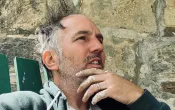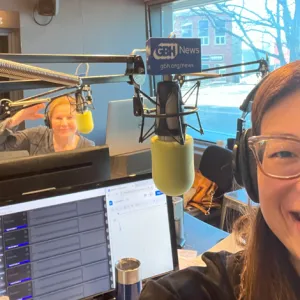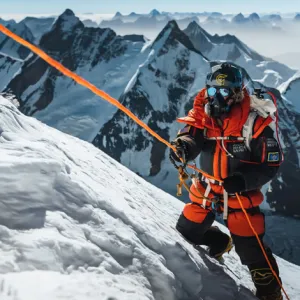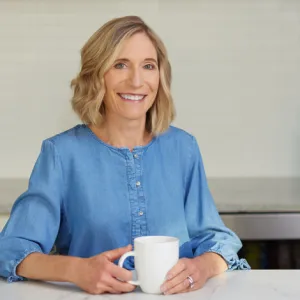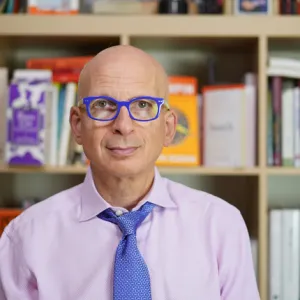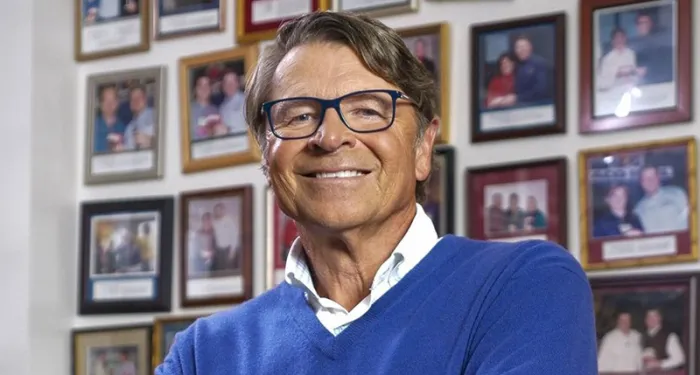
David Novak
Leading Through Gratitude: David Novak
The former CEO built YUM! Brands into a global powerhouse by emphasizing recognition. Now he’s on a mission to redefine leadership.
David Novak knows that people will do what you recognize.
The co-founder and former CEO of YUM! Brands — one of the world's largest restaurant companies — committed to leading his corporation with gratitude for its employees. His investment paid off, enabling the company to double in size while purposefully celebrating the employees who made it successful.
From his childhood in a trailer park to being named CEO of the Year, David credits the power of recognition with shaping his personal and professional life. Now, through David Novak Leadership, his mission is to teach aspiring and existing leaders of all ages to address what he calls a "recognition deficit" in management. He's changing the world, one leader at a time.
Recognition is a Leader's Superpower
David has taught me many lessons about leadership and the importance of recognizing and celebrating those around you. Everyone wants to feel appreciated, and the more you show that appreciation, the more likely it is those honorable actions will continue and inspire others.
His thinking is one of the principal foundations for this podcast, which exists to recognize people doing good things.
In this episode, you'll learn:
- How a retiring employee's tearful confession crystallized the focus of David's leadership style
- Why he handed out rubber chickens, cheese heads, and talking teeth
- The No. 1 reason why employees leave a company, and how to show them everyone counts
- Where to find leadership guidance that will change your life
DAVID NOVAK: Well, thank you, Frank. It's an honor to be on it, and I have to tell you, I don't know any leader that has done as much as you and is still humble and so kind. I'm not surprised that as you continue to make a difference in the world, you created a podcast like this, so I'm thrilled to be on it.
FRANK BLAKE: Well, thank you. I do think recognition is such an underrated superpower in the world, and I'd like to start just; how did you get to that? How did you see that as a major theme of leadership, business, and just living a good life?
DAVID NOVAK: Well, I think, first of all, I just have to give my mom and dad a lot of credit because I grew up in a very humble background, Frank, but I had unbelievable parents. We grew up in a trailer, and they just recognized me throughout my life, and they still are the first one to call me if I ever do anything good…
They're just always recognizing, so I think I was born with a little bit of their genetics, and that helped me. From a business perspective, I got inspired about recognition first when I was at Pizza Hut. I was running marketing, and I gave away these personal pan pizza pans every month, and then I had this big pizza pan that was the traveling pan. It went from office to office. And I saw everybody wanted to get recognized.
But the seminal moment in my life on recognition came when I was the chief operating officer for Pepsi, and I didn't know anything about operations, Frank. I was a marketing guy, and I got this job, and I wanted to demonstrate that I could be more than a marketing person. I had a lot to prove, but I knew the only way I could do it is to go out and learn from the people who really knew what was going on, and for me, like you, I knew I had to go to the front line. I had to listen to the people closest to the customer and see what they thought.
So, I'm in St. Louis doing a round table with ten route salesmen at Pepsi, and I asked people about merchandising. Everybody starts raving about this guy named Bob, and they say, "Oh, Bob. He's the best merchandiser I've ever seen. He's tremendous. I learn more from him in four hours than I learned in my first three years here." And he's getting all this praise, and I look at him at the end of the table, Frank, and he's crying! And I said, "Bob, why are you crying?" He said, "I've been in this company for 47 years. I'm retiring in two weeks and I didn't know people felt this way about me." And that hit me in the gut. I mean, it was like, I go "my gosh, this guy has been in this company for 47 years. He's best in class. He didn't know that people felt this way about him?" and I said, "Gosh."
In my career, from that point on, I was going to make sure the number one behavior I would drive, in whatever work environment or culture that I was going to try to create, was going to be the power of recognition because I didn't want to have Bob's on my team. I wanted Bob's, but I want them to be recognized for what they do, not feel underappreciated. I also look at Bob, and go, "This guy was so good at what he did, but just think how much more he could've contributed if somebody would've plucked him up and given him even more to do." By the way, what he was doing was the most important job in the company because it's closest to the customer, but he could've helped others, maybe, do it even better.
FRANK BLAKE: So, what I love about it is, and again, I learned this from you, we all, as business leaders, know you get what you measure. I think there's a corollary, you get what you celebrate. You want to know what a business is going to drive? Look at what it celebrates, and how did you bring that to life in YUM! Brands?
DAVID NOVAK: So, obviously, it's hard to impact everybody, but you try to do the best you can by casting the right shadow at the top and spreading it throughout your organization and up the organization to the front line. To me, I always believed, like you, you get what you measure, and you get what you celebrate. In fact, my way of talking about that is that it's called purposeful recognition.
I think every leader of every team or every company, there's four or five behaviors that you know that if these things happen, where it really matters, with your customers, you know you're going to be successful. So, what I try to do is identify those behaviors that I knew would drive success, and then I would recognize the heck out of them. Guess what? People do what you recognize, so you see much more of it. Okay?
So, for us, when we first started YUM! Brands, I wanted to start with the restaurant. We studied what were the behaviors of our highest performing restaurants. What did the managers do that really drove the results? And the restaurant manager, we called our number one leader because they built the team that satisfied the customer. Okay? So, we learned that, first of all, the restaurant manager believed in people. They had positive energy. They recognized people. People felt very appreciated. They didn't have any money to do it, but they'd take people to movies, or they'd bring them over to their house for Thanksgiving, or whatever.
They also had accountability. They had a high appreciation for teamwork. Positive energy. So, basically, what we did, is we called them our "How We Work Together Principles". I never liked the idea of "values". It sounds too amorphous. I like, what do you really want people to do? So, we called them our "How We Work Together Principles", and then we started recognizing people in really fun ways.
I did it in a way that was right for my personality. When I was president of KFC, every time I saw one of those behaviors, I would recognize people with a rubber chicken. Give them the rubber chicken, number it, write down what they did to get the recognition, which was one of those behaviors, and I say, "I'm taking a picture of you, and I'm going to put your picture in my office, and then I'm going to send you my picture with you, and you can toss that in the trash if you want, but I'm going to make my office celebrate what you do because people really make it happen."
So I started putting these on the wall, and then I became president of Pizza Hut, and I gave away these cheese heads. You know, like the Green Bay Packer Cheese Heads? And then I became CEO of YUM! Brands, I gave away these walk-and-talk teeth on behalf of our customers because we really wanted people to be customer maniacs. Something I picked up from Home Depot, by the way. I had a lot of fun with recognition, but what I found, Frank, all around the world, people crave recognition, and all around the world because I started recognizing people, people do what the leader expects, and then they started recognizing people, and recognition became the single biggest value of our culture.
I think it's the absolute reason why I got much more credit than I really deserve because it really was my secret weapon for success. It was always the people who were making it happen getting it done, not me.
FRANK BLAKE: Well, it is such a powerful, foundational insight. I also want to take a second and thank you, on air, because I remember hearing you talk about taking photos and putting the photos of your associates on the wall of your office, and so I blatantly stole that idea when I was at Home Depot. Whenever I'd walk into a store, I'd take a picture of it with me and the associate, and say, "If you ever come to Atlanta, you can come to my office and look at your photo on the wall of my office." Some of the most meaningful moments to my time, when people would literally bring their families in to look at their photo on the wall of my office. It's just so amazing, the power of recognition and just having somebody say "Great job. Great job."
And be specific and creative about it, and I think that's part of what you did that was so brilliant, and continue to do, is that you're creative about it. You make it fun. You really connect.
DAVID NOVAK: Yeah. You know, Frank, it's funny because people said, "David, what happens if you run out of wall space?" And I say, "Well, I'll put them up on the ceiling!" And so then I put them up on the ceiling, and I would tell everybody, in terms of having fun, "It's going on the ceiling, and when I get up, everyday I'm going to be looking up at you."
We had fun with it, but the most important thing is, if I would have been the only person doing that recognition in our company, it would've never been that big of deal, but people saw the power of recognition. They got recognized, they saw the power of it, and then they realized, man, it's really a joy to give recognition. You really get happy when you give a little bit of your heart to other people, or some of your time to other people. That really drives your own self-esteem and how you feel about yourself. I think it's just a powerful thing.
What's unfortunate, Frank, and you know this, it's just not happening in our country. We have too much toxic leadership. It's shocking that people don't take the time to recognize. We've done all sorts of research in my company which is now called David Novak Leadership, and we've learned that leaders just aren't doing the recognition. The number one reason why people leave jobs is they don't feel appreciated, and they don't get along with their boss, and the reason they don't get along with their boss is they don't feel appreciated.
So, this makes all kinds of business sense because turnover is a big problem in every company. If you want to keep your people, you need to let them know you're watching. I went out when we started YUM! Brands, and I visited all the best companies at the time. Companies like Home Depot, Walmart, Coca Cola, Southwest Airlines, with all these great companies with great cultures and great consistent results. The number one thing that they all talked about, that was the driver of their success, was creating a work environment or a culture that everyone counts.
It wasn't just the CEO, it was everyone counts. Okay? In fact, the people closest to the customer counted the most because you can't make your customers happy unless they're happy. So, this "everyone counts" notion can really be reinforced, if you're a leader, by focusing on recognition.
FRANK BLAKE: So, tell a little bit about David Novak Leadership. What are you doing?
DAVID NOVAK: Yeah. Well, you know, when I retired, I read Kim Blanchard's book called You Don't Retire, You Refire. So, I refired, and I wanted to focus my time on doing what I love most, which is leadership development. When I was at YUM! Brands, I taught a leadership program called Taking People With You, and I actually wrote a book on it. I taught it to over 4,000 people in our company, and I wrote the book so we could scale it with all our restaurant managers, in eight different languages…
FRANK BLAKE: It's a great book, by the way.
DAVID NOVAK: Thank you very much.
FRANK BLAKE: We're going to have a link to that in our podcast.
DAVID NOVAK: I loved writing the book, but I loved teaching the program. The way I did it, Frank, is I had everybody in the company that came to the program, they had to come in with the single biggest thing that they were working on that could grow our business, and then we worked on a plan in the next three days. I taught every bit of this for three days, and they walked out with a plan on how they could make it happen, how they could take people with them to get it done because nobody can get stuff done by themselves.
Anyway, this was my most favorite thing that I did. It was my most efficient thing because I knew what was going on in the company, and I knew the people, and I helped people get what needed to get done. Anyway, I said, "Okay. How do I make a big difference going forward?" Well, I love leadership, so I'm going to focus on leadership and recognition, and I actually started out with a company called O Go, and it was a recognition company. I decided, no, I'm going to put this under a bigger umbrella of David Novak Leadership, which I did. I do digital leadership training with my company, and I also do these podcasts. I have my own podcast.
It's basically how leaders lead, I give people access to the leaders, like you, that they'd never get otherwise, and it's all free. There's no way you can listen to these podcasts without learning.
You know what else I love about it? I learn so much. I learn stuff about people I've known for 20 years when I do these podcasts! I just think it's great. It's a huge win-win. I'm having a lot of fun with that. We offer two programs. We offer one digital programs called "Purposeful Recognition", which is everything I know about how to recognize and make it happen in your company and your team. Then I have another program called "Essential Leadership Traits", which is a MBA in developing your own personal leadership characteristics.
FRANK BLAKE: And that, anybody can sign up for that?
DAVID NOVAK: Well, the digital programs, actually, we charge for. I'm not trying to make any money, but I have a team that I'd like to see be well, but the podcasts are free.
FRANK BLAKE: Also, it's a level of commitment that you get.
DAVID NOVAK: So far, all I'm doing is losing money. It doesn't matter to me because there's nothing that I do that gives me more joy than trying to help other leaders be the best they can be.
FRANK BLAKE: Now, as you've thought about it and talked to people, why do you think that this recognition element isn't as common as it should be?
DAVID NOVAK: You know, a lot of leaders feel if you recognize somebody, they'll stop working. They'll coast, which is exactly the opposite of what happens. A lot of people say if they recognize this person, everybody else will want to be recognized. They come up with all these reasons why it's going to hinder performance. Okay? When, in fact, it accelerates performance. I always said, I hated that excuse that, "Oh, if I recognize so-and-so, so-and-so will want to be recognized". Well you want them to want to be recognized. You know, if you're only going to recognize one person in your life,
I guess it's probably a bad thing to do, but I always said, "Hey, look! Recognize everybody that's driving those behaviors that you know gets success, and do it spontaneously when you see it." When you see it happen, and stop everybody right then and there, and say, "Boy, Sally. That was a fantastic presentation. We're going to be able to take technology to the next level. That was amazing" or "Gee, Joe. You've been a cook for Kentucky Fried Chicken for 25 years. The quality is so good. Quality is what it's all about. Thanks for all you do." Okay? It really, really works, but people are afraid that people will take their pedal off the metal if they recognize.
FRANK BLAKE: Have you seen any changes in approaches to leadership or the questions that people are asking you during the virus, during this pandemic?
DAVID NOVAK:What do you do in a crisis? I get that question, I'm sure you get that question. I think what people are really learning and the really best CEOs are doing the best thing they're doing, they're communicating, communicating, communicating. They're over-communicating. I just had a conversation, yesterday, with Brian Cornell from Target. He said, "You won't believe everything that we're doing virtually. You know, I actually have almost more personal contact with everybody by doing the virtual work that we're doing right now than I had when I was doing it out there in the field in person." He says, "Because I'm having these chats, and everybody can link into them, and people are starting to ask me questions they would've never asked me because they're getting to know me better."
He said, "I think it's going to change the way our business is done forever." I'm sure it will, but I do think communication in any crisis is key. People need to know. This is how you see the problem, this is what we're going to do about it. This is what we're going to do to make sure everybody is safe. Here's how we're going to come out of this even better. Leaders have got to create hope. You just can't say, "Oh my god. We're never going to get back!" You know? You've got to paint a good future.
FRANK BLAKE: So you also have a foundation, Lift a Life Foundation. What are you doing with your foundation?
DAVID NOVAK: Our foundation is called Lift a Life because what we want to do is help people to achieve their potential who otherwise couldn't achieve without our help. So, we're doing that by focusing on leadership development, type 1 Diabetes — my wife was a type 1 diabetes since she was seven years old — early childhood education, hunger, and veteran support. We're big supporters of the Folds of Iron and helping kids get scholarships.
The thing that I'm spending the most time on this is leadership because we have an addition to the David Novak Leadership which is for profit. We also created this program, that I'm really proud of, called Lead for Change. It's the largest privately funded leadership program in middle schools and high schools in our country. We've got 10,000 teachers. We've reached over a million and a half people. We took my Taking People With You curriculum, and I created training videos for teachers, and the kids get together and work on a project that will make a difference in their community, and the teachers teach them the Taking People With You Principles.
So, this is really exciting. It is so much fun to see this thing grow up because people basically, they don't learn how to lead. We also created the Novak Leadership Institute at University of Missouri where we're taking the Taking People With You and trying to teach students that, college students. Then Ashley, my daughter, found this person named Jan Helsin, who started this program called Global Game Changers where she's teaching leadership in elementary schools where she teaches these kids what's your unique gift. Put your heart into your unique gift and that becomes your superpower, and you can change the world with it. Okay?
It's a great program. So what we're going to do is take our Lead for Change learnings that we have, and help fund her to take Global Game Changers national. We're trying, as a family, to develop leaders in elementary schools, middle schools, high schools, and colleges, and then help aspiring leaders, when they get out of college, through David Novak Leadership.
FRANK BLAKE: That is so brilliant! It makes me wonder, particularly because I think of you as this high energy, optimistic person. In addition to your parents, was there some person or some moment that you said, "Boy, I just…" It's either a recognition moment, or learning about leadership that you think was a pivotal fulcrum?
DAVID NOVAK: Well, you know, Frank, people make all the difference to you in the world. I started out by talking about my parents. I never worked for somebody who didn't ultimately become the CEO of a company. Okay? Everybody I worked for, coming up in my career, was extremely talented and very invested in me. That's something that you can't just make happen. That's God's grace on me. You know? I don't take that for granted, but I had so many people look at me and give me opportunities, and I, obviously, worked my tail off. I wasn't that smart, but nobody was going to outwork me. I had people really invest in me up and down the line.
I think, probably, my greatest mentor was a guy by the name of Andy Pearson who I founded YUM! Brands with, and he was 72 years old. When he passed away at 80, I spoke at his funeral. He was my very best friend, but this guy was a big-time learner. He taught at Harvard business school, was president of PepsiCo. He introduced me to everybody and anybody. I met all these phenomenal people because of Andy, but Andy opened up all these doors for me, and he just believed in me so much.
What was really interesting, Frank, he was famous for being the toughest guy in business. He was one of the top ten toughest bosses in Fortune magazine. They had the cover, and he loved it. He was so proud of it. He came out from that age of like, "I'm going to just kick butt. I'm the smartest guy in the room!" I asked him, "Who's your favorite CEO?" He said, "Don Crandall. Bob Crandall at American Airlines." My favorite CEO is Herb Keller, and I said, "If you and I are going to start this company together, you've got to help me build a company like Southwest Airlines. I don't want to be like American Airlines." I handed him this book called Nuts, and I had him read it, and he came back and said, "I can support you on this. The only thing is, I want to be the CEO instead of you when we start the company."
Anyway, we became best friends. This guy, he just, every day, he got up, he read books, he read newspapers, he knew everybody, and he literally just opened up so many doors for me and taught me so much on how to be a leader. There's very few days that I go by without thinking of him.
FRANK BLAKE: That's very cool. That's great.
DAVID NOVAK: I want tell you, Frank, one funny story. His favorite article, before he died, was Fast Company did a story on our relationship, and it was "Andy Pearson Finds Love". He talked about the method that he learned about valuing people and appreciating.
FRANK BLAKE: That is so cool.
DAVID NOVAK: And I learned how to be a little bit tougher. I had to get a little tougher. We kind of melded together.
FRANK BLAKE: One of the other things I'd love to get your thoughts on are retail and the front line associates because I think retail, it's not appreciated as it should be for ways people learn to work and build careers, and you must have seen the same thing.
DAVID NOVAK: Well, I want to give a shout out to McDonald's in our industry because they've got a great advertising campaign. It's like your first job, and it's all about how McDonald's gets you started in your career, but I always said that our front line jobs are amazing because they teach you life skills. They teach you how to be empathetic with the customer. They teach you how to listen to the customer. They teach you how to recover when you make mistakes, and we all make mistakes. These are basic life skills that you're going to need throughout your career whether you stay in the front line and work in retail forever, or if you move up. You know as well as I do, Frank, there are all kinds of people at YUM! Brands and Home Depot that started out at the front line and end up being Chief Operating Officers and Presidents and CEOs, and that's what people don't talk about in retail.
I hate it when I hear the media talk about burger flippers and front line people and minimum wage and all this kind of good stuff. These are the jobs that make America what it is, and if we believe in people and treat people well, the cream will rise to the top.
FRANK BLAKE: I think that is so true.
DAVID NOVAK: I think retail jobs are phenomenal, and, by the way, we'd have a lot of unemployment if we didn't have retail jobs.
FRANK BLAKE: That's true, too. What are a couple of the biggest things you've learned as you've done the David Novak Leadership Program?
DAVID NOVAK: One thing is, all the great leaders are humble. They have a lot of self-confidence, but they're humble. They know they can't get it done alone. I think that's what humility is all about. It's not you're the smartest person in the room. I think that's one thing I've really learned.
I do a lot of podcasts with entrepreneurs. I always thought that the biggest thing you need to do in marketing is solve your customers' biggest problems. Well, the entrepreneurs, they understand this intuitively. They get it. They know that you need to solve the most important problems that occur most frequently for your customers, and then you have a big idea. That's how you disrupt the category. That's how they do these kinds of things. I really see how these people think, and I think that's a really big lesson for people to listen to when they're listening to the podcast.
And then the third thing, I would say, Frank, is the best leaders, they are avid learners. They love what they do. Because they love what they do, they want to learn more about it. They're immersed in it. It's like, Warren Buffet told me once that he just tap dances to work. In fact, he wrote a book on that. That's what the great leaders do. They tap dance to work because they love what they're doing and they learn. They don't care where it comes from. Constantly learning, going and visiting other companies, visiting other people, just to get an edge.
FRANK BLAKE: Two final questions. First question; do you see any difference? So now, you're reaching out. You're addressing leadership at lots of different age levels. Do you see any difference in the coming generation of leaders on what they're looking for, how they're approaching leadership?
DAVID NOVAK: I think that basic, innate things that are going to drive leadership today are the same things that drove leadership in my era, your era, and in the past. People want to make a difference in other people's lives.
The best leaders are focused on that. The results come. It's amazing. You do the right things, and the right things happen. I think this generation of people coming up today, they understand that better than our generation did and the the generation before us because it was more top-down, tell people what you're supposed to do, you're the smart guy in the room. This generation understands that the best idea you can come up with is your own. Feed the beast. Feed people the information. Let people come to their own conclusions, and they want to be involved. No involvement, no commitment. So they want that, and they're really looking for leadership development. They want to be developed, and the problem is they're just not getting it.
FRANK BLAKE: Right. For everyone listening who wants to follow up, either with your leadership institute or something else, what are the best ways to track what David Novak is thinking?
DAVID NOVAK: Well, I think you should go to DavidNovakLeadership.com. We have free podcasts. We have free blogs. We post a lot of information that I think would help anybody, and then we have very affordable digital leadership programs you can take if you'd like to take them. I try to post a daily inspirational tweet. I make most days. That's @DavidNovakOGO, and I'm getting started on Instagram and all the social media channels.
FRANK BLAKE: Perfect. Well, I can't thank you enough. I've learned so much from you, over time. I know the people listening to this podcast have learned, and so appreciate your time.
DAVID NOVAK: You know, Frank, I've got to tell you. Everybody I talk to, what leader do you admire most? Anybody that's been around you, says it's you.
FRANK BLAKE: You're very kind.
DAVID NOVAK: No, no. I'm not kind. I'm honest.
FRANK BLAKE: It's awesome. It is awesome. Thank you so much.
